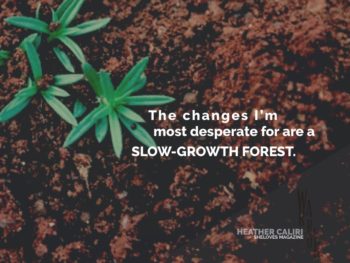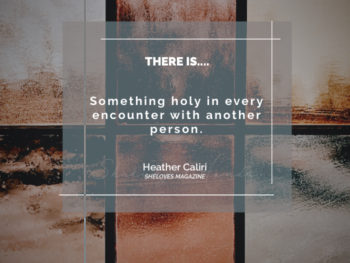
As a writer, I face a blank page each and every day. I have to come up with idea after idea and sit down, each time wondering if I’ll be able to pull it off.
The problem is less acute now, because I’ve practiced. And practiced.
But it wasn’t always like that.
When I was a beginner, before I’d practiced and proved to myself that indeed I could and would write, no matter what, I had to show up anyway. Ira Glass, the host of public radio’s This American Life, nicely encapsulated this problem in a viral interview: when anyone starts creative work, they have great taste but lousy skills. And it takes a long, long, long time for that gap to close. (For me, it’s taken more than fifteen years.)
In other words, when you are shakiest and most unsure of yourself, you get to sit down, each time, and see that what you most dream of doing is not possible, at least not yet. You simply aren’t as good as you wish.
It’s not about being talented. It’s not about being taught. It’s not even about believing in yourself, exactly. It’s almost the opposite.
You must show up, day in and day out, with the ache of knowing that you’re kinda sucky.
You do it because the practice of writing, or painting, or filmmaking or sculpture makes you alive, even when your product is atrocious. You find one turn of phrase that makes your heart beat faster, you put your finger on one truth that stills something inside of you, you find the joy of finishing something heartfelt and good enough.
In much the same way, most of us are pretty lousy Christians. Beginners. Hacks. Wanna-bes.
Our prayers are self-centered. Our theology is full of holes. We don’t love our neighbors. Our confessions are full of individual and corporate blind spots. Our churches are not just imperfect but dysfunctional or even abusive. We use God as a way to paper over our problems instead of bowing down before him. We are blind, and dumb, and handicapped when it comes to faith.
Oh, God, we know it all too well.
But.
Showing up to pray even when we know our prayers are broken is manna.
Committing to a church even when it’s fraught and imperfect connects us to Christ’s body.
Reading the Bible even after it’s hurt us can makes our hearts heal.
But we don’t sing “Amazing Grace” and try to give ourselves a pep talk, charming ourselves into believing we’re actually incredibly, blissfully, unimpeachably talented. We don’t lie to ourselves.
No, we focus on showing up with our little dim spark, and let that be enough. Day after day after day.
And after five, or ten or fifteen years you look down and realize that your dim spark is brighter and lovelier than you remembered it being. But you almost don’t care anymore because–you’ve gotten something better.
You’ve gotten the sure knowledge that you will show up for what really matters in your life. Even when it’s frustrating.
Oh, masterful, competent work is lovely, as far as it goes, but what’s really precious, what is really the art is the journey you took to get there.
Always, always, the art is in the doing and failing as much as it is in the finishing.
And the journey towards that broken-hearted acceptance of your suckiness transforms you.
You come to prayer with a sense that the showing up is as precious as the words you say.
And lift your hands in the congregation because it is blessed to stand shoulder to shoulder with other believers, broken as you are.
And you open the Bible to a favorite Psalm and savor the one page of the Word you can handle reading.
Faith is a daily encounter that can be incredibly fraught. It’s so vulnerable to believe, to show up when you doubt, and to face the blankness of a God we cannot see.
Are you ready to get comfortable with your own suckiness in faith? And praise God that He helps you show up with open hands anyway?














 Gathering is a pain in the ass
Gathering is a pain in the ass
[…] housework and art, caregiving is not about doing things perfectly. It’s about showing up. Every moment is another […]